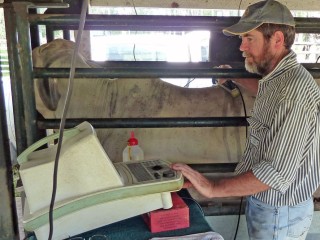 One of Australia's longest-running cattle genetics projects, spanning 12 years of intensive recording, will complete its course today when the last group of No.3 cows have their calves weaned at Swan’s Lagoon station in North Queensland.
One of Australia's longest-running cattle genetics projects, spanning 12 years of intensive recording, will complete its course today when the last group of No.3 cows have their calves weaned at Swan’s Lagoon station in North Queensland.
The massive data collection exercise involved recording 2200 Brahman and Tropical Composite female cattle over nine years, their steer half-brothers over three years and 3500 of their bull calves over the first two years of their lives in a flagship project of the CRC for Beef Genetic Technologies.
A press release issued by Beef CRC today said it had been a huge cooperative effort of science and industry, with the majority of the cattle having been run on five Queensland research stations.
Lead researcher, Dr David Johnston, from the Animal Genetics and Breeding Unit at the University of New England, praised the commitment of producers and the highly skilled technical expertise from CSIRO Livestock Industries, DEEDI and AGBU that led to the project’s positive outcomes.
These collaborations had resulted in a world-first comprehensive understanding of whole herd profitability, with the key focus being the genetic basis of female reproduction in tropical cattle from puberty to six calvings, the press release said.
“I can’t stress enough how important and rare this level of information is. Extensive measurements were performed on every cow many times, including ovarian scans, weight and condition scores, adaptation scores and temperament assessments, with meat quality and feed efficiency measured in their steer half-sibs.” Dr Johnston said.
Big spin-offs
The results promise big spin-offs for the northern beef industry. The data is already being used extensively in Breedplan, and new knowledge about genetic relationships between heifer puberty, lactation anoestrus in cows as well as indicators of female reproduction in bulls, all provide management recommendations for producers.
Many more genetic results will become available as the data continues to be analysed over coming months. DNA testing also means the genomics of tropical breeds and composites can be explored in these cattle.
The North Australian Pastoral Co has been involved with the Beef CRC since 1993 with the donation of cattle for the original crossbreeding program conducted at Duck Ponds near Comet in Central Queensland. NAPCo’s general manager, growing and marketing, Geoff Kingston, said since then, NAPCo had incorporated research outcomes into its own composite breeding programs.
“This has delivered a level of sophistication for our bull breeding programs unimaginable ten years ago,” he said.
“Our animal selection has evolved from simple growth ratios to the use of EBVs and $ Indexes incorporating many of the technologies and research findings from this genetic project,” Mr Kingston said.
775,000 live animal records
To put the project into context, across all measures in total there have been 775,000 live animal records taken in the 2200 cows alone. This has provided an extremely powerful set of data.
It has not always been an easy task to accumulate the records, however, the CRC said. Since the project started in 1999, it had endured droughts, floods and cyclones which not only interfered with experimental timetables, but in some cases also forced the relocation of cattle. Most importantly though, stock losses were avoided.
“There were the inevitable difficulties in maintaining funding for the necessary time, but thanks to the commitment of the northern producers and our CRC staff we got through as planned, and we now have lifetime records on 2200 tropical cattle,” Dr Johnston said.
“The value of the knowledge dataset should have long-lasting impacts for the Northern beef industry and prove to be an invaluable resource that allows future research to validated data for years to come,” NAPCo’s Geoff Kingston said.
Dr Johnston said genetics was a key factor for lifting reproductive performance in northern Australia.
“Producers need to focus particularly on their first-calf cows that are back in calf as three-year-olds and ensure they retain their progeny. There are tropical cattle out there that will calve every year -you just have to know how to look for them,” he said.
Critically, the project would not have been possible without the long term financial commitment of the northern pastoral group of companies and individual breeders.
Ten long-term and very significant contributors have provided generous and crucial involvement: Australian Agricultural Co; Carolyn Briggs, Cona Creek, Springsure; Consolidated Pastoral Co; John and Sue Halberstater, Mandalay, Jambin; S. Kidman and Co; Tom Mann, Hillgrove, Charters Towers; Jennifer McCamley, Tartrus, Marlborough; MDH Pty Ltd; North Australian Pastoral Co; and Stanbroke Pastoral Co.



HAVE YOUR SAY